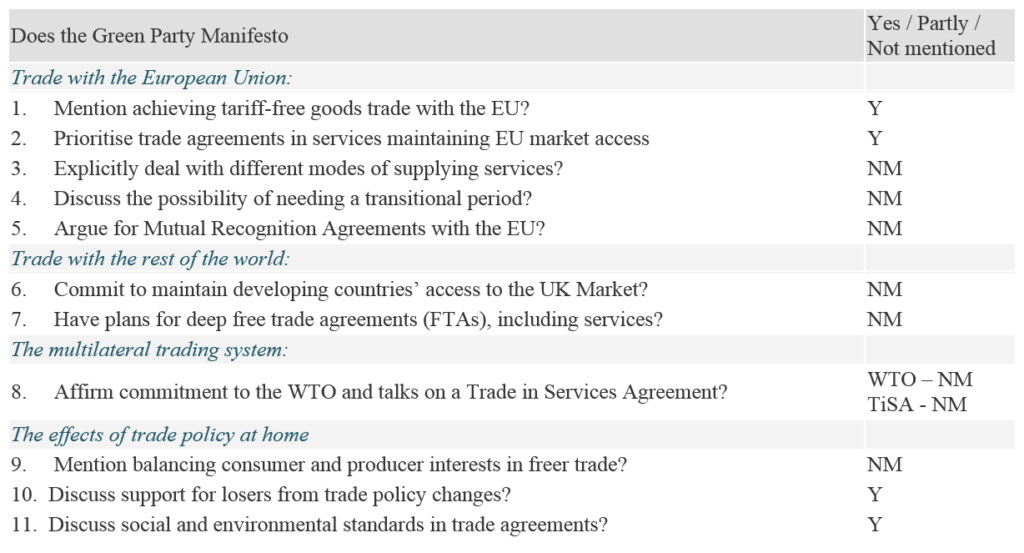24 May 2017
Compiled by Fellows of UKTPO
Brexit will leave many areas of UK policy open to change. International trade policy is among the most important of these for UK prosperity and also among the most immediate because the status quo cannot simply be extended. This is the fourth in a series of blogs reporting what the major political parties say about trade policy in their 2017 manifestos, as they become available.
The UK Trade Policy Observatory (UKTPO) has set out a series of issues that it believes should be considered in any election manifesto that might form the basis of the UK’s future trade policy. The table below checks whether or not the Green Party Manifesto mentions these important elements explicitly or implicitly. Following that we offer a brief commentary on the treatment of trade policy in the manifesto.
A central aim of the Green Party is for the UK to remain in the EU, or at least in the single market. The former implies no change to current trade policies and hence little need to discuss them in the manifesto. Thus their coverage of trade policy beyond that with the EU is restricted to human rights and social and environmental conditions.

The Green Party’s central pledge in their manifesto, the “Green Guarantee”, is a commitment to a continued EU membership, which, they argue, will make ‘the UK’s future more hopeful and secure’. They commit to hold a referendum on the detail of whatever deal is negotiated for Britain’s departure from the EU, with the option to reject the deal and remain in the EU. Explicitly, the Greens prioritise remaining within the Single Market as an essential condition of any future trade deal and they reject a ‘hard’ Brexit.
“We do not accept that either a “hard” Brexit or an exit from the EU without a deal is in the interest of the British people.”
The Green Party does not spell out the details about the nature of the new trade relationship between the UK and the EU-27 post-Brexit – instead, they pledge to keep the status quo: protecting the freedom of movement and pressing for access to the Single Market.
Beyond calls to protect the freedom of movement, the Green Party wants immediately to guarantee the rights of EU citizens resident in the UK to remain – and to seek similar reciprocal arrangements for UK citizens in the EU. In particular, the manifesto states that it is important that young people from this country have the opportunity to study, work and live in the EU – advocating continued access to EU-funded programmes such as Erasmus.
As far as trade with third countries is concerned, the manifesto does not elaborate on how Brexit will affect the future trading relationship of the UK with the rest of the world – nor does it state a commitment to the World Trade Organisation and the multilateral system.
The Green Party manifesto emphasises putting social and environmental protection at the heart of any future trade deals (and allowing MPs’ a vote on any deal in Parliament) – calling for “trade rules that respect human rights, labour standards and climate commitments”. It also expresses an aim to safeguard jobs potentially affected by any changes in trade policy.
While the UK Trade Policy Observatory (UKTPO) takes no institutional position and will continue to remain firmly non-partisan during the UK General Election, it believes it is useful to share some of the questions that its fellows think will be important when reviewing what the party manifestos say about trade.
Examining manifestos is particularly important, because the winning party’s manifesto may be cited under the Salisbury Convention, which precludes the House of Lords from opposing bills passed by the Commons to honour election manifesto pledges.
Disclaimer:
The opinions expressed in this blog do not necessarily represent the opinions of the University of Sussex.
Republishing guidelines
The UK Trade Policy Observatory believes in the free flow of information and encourages readers to cite our materials, providing due acknowledgement. For online use, this should be a link to he original resource on the our website. We do not however, publish under a Creative Commons license. This means you CANNOT republish our articles online or in print for free.